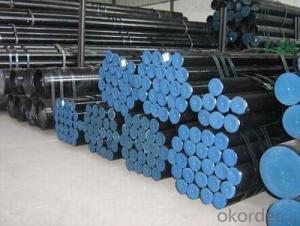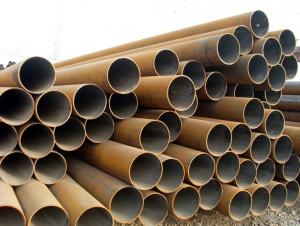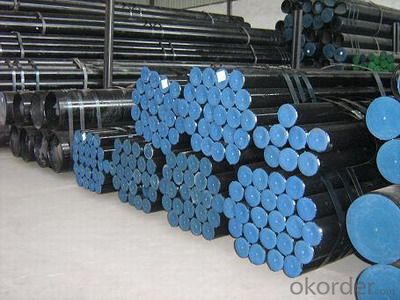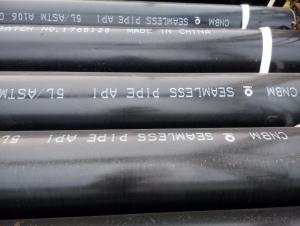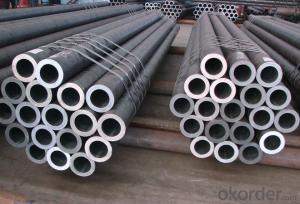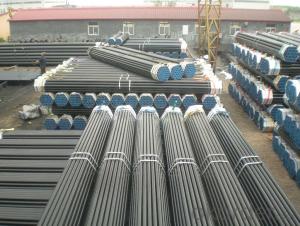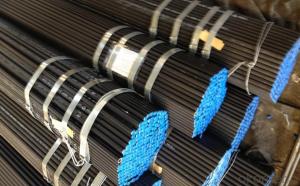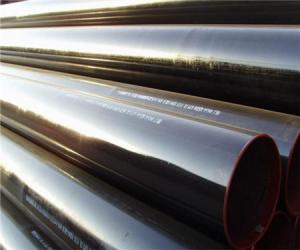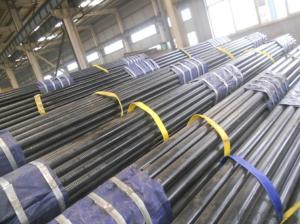ASTM A106-2006 API 5L / 5CT seamless Steel Pipes
- Loading Port:
- Tianjin
- Payment Terms:
- TT or LC
- Min Order Qty:
- 25 m.t.
- Supply Capability:
- 10000 m.t./month
OKorder Service Pledge
OKorder Financial Service
You Might Also Like
We are company that have many years experien. Seamless pipe possesses a hollow section and without seam around the strip steel. It is made with solid bar or steel ingot by perforating machine. As the facture process does not include any welding, seamless pipes are considered to be stronger and more durable. Generally speaking, seamless pipe has better pressure resistance and security than other classifications, and was usually more easily available than welded pipe. We are company that have many years experience and professional manager team and engineer team and sales team, sure we will provide you high quality of pipe and professioanl service.
2、Main Features of the Seamless Pipe:
• High working accuracy
• High strength
• Small inertia resistance
• Strong therming dissipine ability
• Good appearance
• Reasonble price
3、Seamless Pipe Specification:
Standard | GB, DIN, ASTM ASTM A106-2006, ASTM A53-2007 |
Grade | 10#-45#, 16Mn 10#, 20#, 45#, 16Mn |
Thickness | 8 - 33 mm |
Section Shape | Round |
Outer Diameter | 133 - 219 mm |
Place of Origin | Shandong, China (Mainland) |
Secondary Or Not | Non-secondary |
Application | Hydraulic Pipe |
Technique | Cold Drawn |
Certification | API |
Surface Treatment | factory state or painted black |
Special Pipe | API Pipe |
Alloy Or Not | Non-alloy |
Length | 5-12M |
Outer Diameter | 21.3-610mm |
Grade | 20#, 45#, Q345, API J55, API K55, API L80, API N80, API P110, A53B |
Standard | ASME, ASTM |
1) Material:20#(ASTM A 106/A53 GRB.API5LGRB,GB),45#,16Mn,10#.
2) Specification range: OD: 21.3-610mm, WT:6-70mm, length:6-12m or according to the requirement of clients.
3) Executive standards: GB, ASME API5L.ASTM A 106/A53,Despite of the above standards, we can also supply seamless steel pipe with standard of DIN, JIS, and so on, and also develop new products according to the requirements of our clients!
4) Surface: black lacquered, varnish coating or galvanized.
5) Ends: Beveled or square cut, plastic capped, painted.
6) Packing: bundles wrapped with strong steel strip, seaworthy packing.
4、Packaging & Delivery:
Packaging Details: | seaworthy package, bundles wrapped with strong steel strip |
Delivery Detail: | 15-30days after received 30%TT |
5、FAQ of Seamless Pipe:
①How is the quality of your products?
We have many years business experience in this area, and we have professional engineer and manager team and sure we can provide you high quality production and professional service.
②How about price?
Yes, we are factory and be able to give you lowest price below market one, and we have a policy that “ for saving time and absolutely honest business attitude, we quote as lowest as possible for any customer, and discount can be given according to quantity”,if you like bargain and factory price is not low enough as you think, just don’t waste your time.Please trust the quotation we would give you, it is professional one.
③Why should you chose us?
We can give you both.Additionally, we can also offer professional products inquiry, products knowledge train(for agents), smooth goods delivery, exellent customer solution proposals.Our service formula: good quality+good price+good service=customer’s trust
SGS test is available, customer inspection before shipping is welcome, third party inspection is no problem.
6、Seamless Pipe Images:
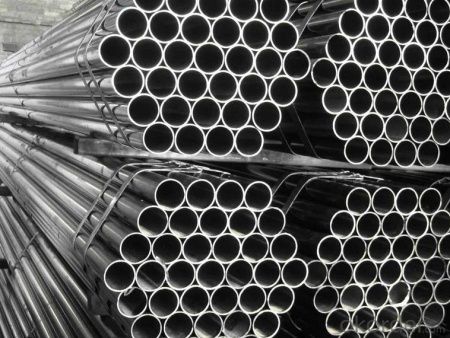
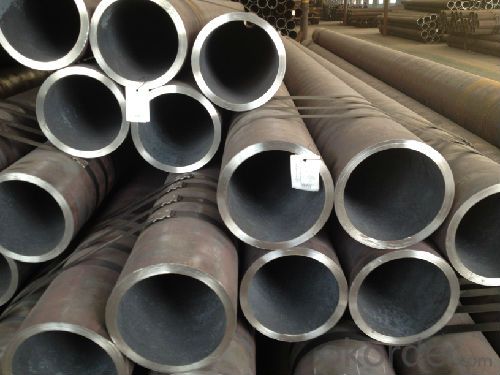
- Q: How are steel pipes used in the agricultural irrigation systems?
- Steel pipes are commonly used in agricultural irrigation systems due to their durability and strength. These pipes are used to transport water from a water source, such as a well or a reservoir, to the fields where crops are grown. One of the main advantages of using steel pipes in agricultural irrigation systems is their ability to withstand high pressure and heavy loads. This makes them suitable for transporting large volumes of water over long distances without the risk of bursting or breaking. Steel pipes also have a high resistance to corrosion, which is important in agricultural settings where the pipes may come into contact with fertilizers or other chemicals. In addition to their durability, steel pipes provide a smooth interior surface that helps to minimize friction and maintain a consistent water flow. This is crucial in irrigation systems as it ensures that the water is evenly distributed across the fields, promoting optimal crop growth. Furthermore, steel pipes can be easily connected and configured to match the specific layout and requirements of the irrigation system. Overall, steel pipes play a vital role in agricultural irrigation systems by facilitating the efficient and reliable transport of water to crops. Their strength, durability, resistance to corrosion, and smooth interior surface make them an ideal choice for these applications.
- Q: What is the difference between carbon steel and cast iron pipes?
- The main difference between carbon steel and cast iron pipes lies in their composition and manufacturing processes. Carbon steel pipes are made from an alloy of iron and carbon, with additional elements such as manganese and silicon added for specific properties. They are typically stronger and more durable, making them suitable for high-pressure and heavy-duty applications. On the other hand, cast iron pipes are made by melting iron and pouring it into molds, resulting in a more brittle and less flexible material. Cast iron pipes are commonly used for drainage and sewage systems due to their corrosion resistance and sound insulation properties.
- Q: How are steel pipes protected against lightning strikes?
- Steel pipes are typically protected against lightning strikes through the use of lightning rods and grounding systems. These measures help to divert the electrical energy from a lightning strike away from the steel pipes, preventing damage or potential accidents.
- Q: How do steel pipes handle ground freezing and thawing?
- Steel pipes are highly resistant to the effects of ground freezing and thawing. The inherent strength and durability of steel make it an ideal material for handling these thermal cycles. When the ground freezes, steel pipes are able to withstand the expansion forces exerted by the freezing water without any significant damage. The structural integrity of steel pipes remains intact even under extreme cold conditions. During thawing, steel pipes also fare well due to their ability to contract without compromising their strength. The material's flexibility ensures that it can accommodate the contraction of the ground without causing any structural issues. Steel pipes do not crack or break when exposed to the rapid temperature changes associated with thawing. Furthermore, steel pipes have a smooth internal surface, which reduces the risk of ice formation and subsequent blockages. This is particularly important in areas with frequent freezing and thawing cycles, as it helps to maintain a consistent flow of fluids or gases through the pipes. In summary, steel pipes are an excellent choice for handling ground freezing and thawing. Their strength, durability, and ability to withstand temperature fluctuations make them a reliable and long-lasting solution in such environments.
- Q: Can steel pipes be bent?
- Steel pipes can indeed be bent. To achieve this, one usually employs specific tools and methods like pipe bending machines or hydraulic presses. These tools exert pressure on the pipe, leading it to change shape and adopt the desired angle or form. The flexibility of steel pipes makes them adaptable and appropriate for an array of purposes, such as plumbing, construction, and manufacturing. Nonetheless, it's crucial to acknowledge that the extent to which a steel pipe can be bent relies on factors like its diameter, wall thickness, and the type of steel employed.
- Q: How are steel pipes used in the manufacturing of agricultural machinery?
- Steel pipes are commonly used in the manufacturing of agricultural machinery for various purposes such as structural support, fluid transportation, and protection. They are utilized to create the framework and chassis of the machinery, providing strength and durability. Steel pipes are also used to transport fluids such as fuel, water, and chemicals throughout the machinery. Additionally, steel pipes can be used to protect vulnerable components from external elements, ensuring the longevity and reliability of the agricultural machinery.
- Q: How are steel pipes classified according to their use?
- Steel pipes can be classified according to their use into various categories such as structural pipes, plumbing pipes, oil and gas pipes, and industrial pipes.
- Q: How are steel pipes used in the construction of solar power plants?
- Steel pipes are commonly used in the construction of solar power plants for various purposes. They are primarily utilized for the installation of solar panel mounting structures, which require sturdy and reliable support systems. Steel pipes are also used for the construction of infrastructure such as frames, racks, and supports for the solar panels. Additionally, they are employed in the installation of water and coolant systems, as well as for the transmission of fluids and gases within the plant. Overall, steel pipes play a crucial role in providing structural integrity and efficient functionality to solar power plants.
- Q: What is the difference between hot-finished and cold-finished steel pipes?
- Hot-finished steel pipes are produced by heating the steel to a high temperature and then passing it through a series of rollers to give it the desired shape and size. This process results in a smooth surface finish and improved mechanical properties. On the other hand, cold-finished steel pipes are produced by cold drawing the steel through a die, resulting in a smaller diameter and improved dimensional accuracy. Cold-finished pipes have a smoother surface finish and tighter tolerances compared to hot-finished pipes.
- Q: How do steel pipes handle seismic activities?
- Steel pipes are highly durable and flexible, making them well-suited for handling seismic activities. The inherent strength and elasticity of steel allow the pipes to withstand ground movements during earthquakes without fracturing or collapsing. Additionally, steel pipes can absorb and distribute seismic forces throughout their structure, reducing the risk of damage or failure.
Send your message to us
ASTM A106-2006 API 5L / 5CT seamless Steel Pipes
- Loading Port:
- Tianjin
- Payment Terms:
- TT or LC
- Min Order Qty:
- 25 m.t.
- Supply Capability:
- 10000 m.t./month
OKorder Service Pledge
OKorder Financial Service
Similar products
Hot products
Hot Searches
Related keywords
